Civil War Archive 171st PA Soldiers Plundered Secessionists Women Wept
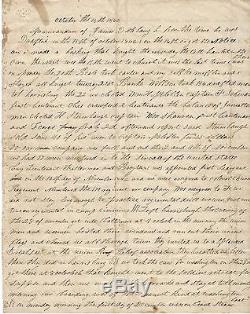
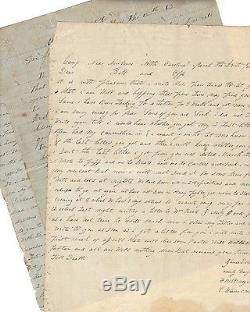
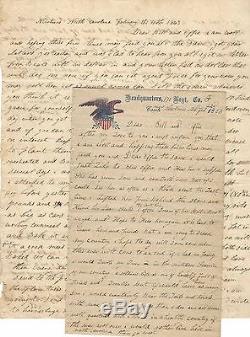
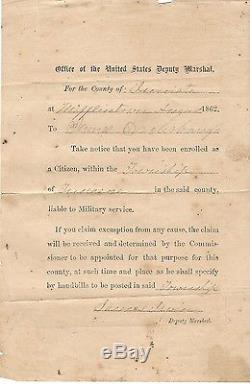
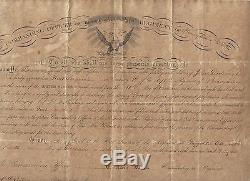
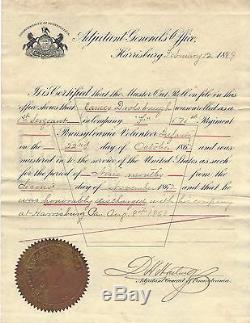

Drolsbaugh was drafted and mustered into Company F. 171th Pennsylvania Infantry as the First Sergeant on November 2, 1862, and mustered out with the company August 8, 1863 after nine months service.
Company F was raised in Juniata County, PA. The men of the 171st Pennsylvania were drafted. They were organized at Camp Curtin, Harrisburg, PA, in November 1862. They wintered at Newbern, NC, and in April 1863 they were under fire at Blount's Creek but suffered no losses.
In June 1863, they were sent to White House Virginia, and were moved to Harper's Ferry on July 7 to assist in the pursuit of the Confederate army after the Battle of Gettysburg. Offering an exceptional and extensive archive, which includes a Drolsbaughs 8 pp journal with extraordinary detail, 7 ¾ x 9 ¾ on four disbound sheets, covering October 15, 1862 to March 28, 1863; 15 letters, various sizes and lengths, but most two pages, most in ink, dating from October 28, 1862, to March 27, 1864; a 5 ½ x 8 ¼ document, dated August 1862, from the United States Deputy Marshall notifying Drolsbaugh that he is eligible to be drafted; his 9 ½ x 14 ¾ appointment as First Sergeant in Company F of the 171. Regiment, signed at Suffolk, VA, on December 24, 1862; a 8 ¼ x 11 document from the Pennsylvanias Adjutant Generals Office, February 12, 1889, certifying Drolsbaughs service as First Sergeant; an albumen, dated 1867, of Drolsbaughs daughter Effie and Thomas M. Drolsbaugh, possibly the son of James and Elisa Drolsbaugh; several documents relating to Thomas M. Drolsbaughs service in the Ohio National Guard in the 1890s. Drolsbaugh's journal, which begins on October 15, 1862, the day he was drafted, reads like a running narrative of five of his ten months of service in the 171st Regiment. He writes: Banks Willson took 136 drafted men to Harrisburg. He goes on to note the elections of several officers.I was appointed first sergeant and on the 10. Of November 1862 and we were assigned to Colonel E. Bieners Regiment Numbered the 171 regimentWe were assigned to Co. We left Harrisburg the evening of the 28 of November got into Baltimore at 4 oclock in the morning. The union men and weeman [women] hoisted their windows and run out their union flags and cheered us all through town.
They invited us to a splendid breakfast at the Union Relief Association. They treated us better than they did in Harrisburg. We took cars for Washington on the 29.
Got there at 8 oclockwent to the soldiers retreat for supper and then we went to the barracks and stayed til Monday morning. Our boarding was the meanest kind at Washington. On Monday morning, the first day of December, went on board the Steamboat Went down the Potomac 250 miles and shored at 6 oclock on account of fog.
Slept in the dining room. We started and got to Fortress Monroe at 5 oclock in the evening.
Lay in the boat til morning and then the 3d day of December started for Norfolk about 30 or 40 miles up the Elizabeth River. Took the cars in the evening for Suffolk. It was rainingGot to Suffolk after dark and we lay in the woods that knight [sic]. The next daywe set up our tents in the evening. Harper took sick and died on the 9.And was buried on the 12. In the grave yard near Suffolk. He had the small pox or brain feverJust got comfortably fixed when we got marching orders on the 24.
Of December and then there was nothing done till the 26. Then we tookthrough the mud and swamp and pine deserts. We marched 18 miles til 12oclock at knight. Took our march for GaitesvilleWe were halted by the rebbels.
Our Cavalry was sent to the front and the rebbels fled. We started and went to Gaitesville where we were to take the boat but the rebels got ahead of us and we had to take another road. After dark, the rebels came in sight of us. I seen them ride through a cornfield. It was clear [as] moonshine but we did not know how many there was.
We got orders to halt and load. We were drawn in line all along the road. The rebels did not advance on us as we were not anxious to attack them. After some time we were ordered to sleep on our arms and we were so tired. We lay down in the woods without supper and we did not care whether the rebbels took us or not. Marched till 9 oclock at knight when we arrived atBranden Landing. It was raining and cold wind. We lay on the river bank til 11 oclock at knight when we got on the Steam Sail ShipDecember 31. We took sailWe crossed the Albermarle Sound. The water was mostly smoothbut at 12 oclock when we were crossing Pamlico Sound, there was a great storm. The sailors were frightened and our men got sea sick. Some of them was almost thrown out of the boat.New Years morning it got calm and we landed at Newbern, North Carolina, about 3 oclock in the evening we were marched 1 and ½ miles from town and encamped in a field and got orders to build shanties for ourselves and on the 6. Of January we were mustered in for pay. Drolsbaugh then inserts notes from his earlier home visit.
Went home to see my friends 2 times when I was at Harrisburg. The country through Maryland was splendid farm land but poor buildings. Washington city is a handsome place but they did not treat us well. They sweetened our coffee with sous molasses and gave us stinken meat.We seen Fort Washington on the Potomac and Mount Vernon. We seen the monitor gun boat, the rebell Merrimac, the crazy islands, Roanoke Islands, rebells blockade and the boats they had abandoned. Norfolk is a dirty and poor place and Suffolk is no better. The country is level and swampy. On our march, we took 3 days rations, our blankets, tents and 4 rounds of cartridges on our backs.
Our load was about 30 pounds. We did not go many miles till the soldiers began to throw away the blankets. Their load was too much for them. It was warm and muddy. When we got out among the Secessionists, our soldiers took their horses, chickens, bread, apples, sweet potatoes and made them cook for our men. The white men were nearly all in the rebell army. The Negroes and white weemen was attending to farming in North CarolinaOur men plundered all their houses, took what they wanted. The women would scream and cry but it was of no use. I thought a pity of them for all they were rebels and I did not steal or take anything from them. There were about 30,000 of our men and you may think they would scare anybody. Some of the farmers was butchering. Some had 30 hogs hung up and our men took as much meat from them as they wanted and tore down their bee hives and eat their honey. We were in General Spinolas Brigade and he was as mean a man as ever lived. He made us wade through the swampSometimes we rolled up our pants, took off our shoes and waded the creeks.Our colonel said he never seen men run as far as we hadbut he had to do what the general ordered. Our colonel is a perfect gentleman. Newbern is a splendid town and country. The rebels burned the best part of the townThe inhabitants of North Carolina are mostly for the Union.
Great numbers of them are enlisted in our army. There is thousands of Negroes here working around our camps.There is from 70 to 80,000 troops here and they are still coming. January 1863: At 9 oclock on the knight of the 22d, we got orders to pack up and be ready to march againand report at the block house across the Trent River. We did so and also ordered 25 men out of each company with spades. When we got to the block house, we learned that [Stonewall] Jackson has sent word for the citizens to leave town for he was going to burn the town.
Our colonel said he expected the enemy here before knight. We got to work and made a rifle pit 183 yards long and 63 yards. Half done, the ditch was 10 feet wide, 8 feet deepWe detailed 3 men to go on shipThe 29. At 9 oclock in the morning destination to Elizabeth City.
The railroad leading to Beufort run close on the west by our camp, the Trent River on the northOur camp is 1 mile south of Newbern City27. Of January got orders to detail 3 men to go on a shipThey left the morning of the 28.
Abraham Goodling was sent to Fortress Monroe Hospital. Of February 1863, our whole company was detailed to cut down timber at different points. No one was left in camp except some few sick and the present guards. John Landis and myself started a Union prayer meeting. Of February, I went and seen the battle ground of Burnside when he took Newbern.
The trees that was 1 foot in diameter was shot by cannon ballsThe small bushes and saplings were cut byballs. There was any amount of clothing and graves. Our men were buried decently and many of them had head boardsMany more had not and their graves were all grown over with grass. Others were taken up and conveyed to their respectful homes.The rebells were thrown in heaps. Some holes 10 feet square were filled up.
The flag staff was raised and Sunday the 22. Spinolas Brigade was inspected and the flag hoisted on Fort. Spinola and 32 guns fixed in memory of our beloved Washington25. Of February, Major General Foster reviewed our troops of Newbern. Estimated 16 or 18,000 menIn the evening of the 4.
Of March, we got orders to cook 3 days rations and hold ourselves in readiness for a march at an hours notice. On the morning of the 6. We took up our line of march. 6,000 strong encamped on Mcdennys Farm, 8 miles from Trenton. Saturday morning got orders to have breakfast over and pack our knapsacks and overcoats in a vacant house near our Camp. Duncan was detailed to guard our baggage. We loaded our arms and started for Trenton andthe rebels run away. So the citizens surrendered the twon to us and we came back to our baggage, took some crackers and coffee and started for Jackson. Run into camp at 8 oclock near White Oak River, built a bridge on Sunday morning. Heard the rebells call their roll. Planted a brass battery on the bank till we got the bridge rebuilt.The New York regiment crossed the bridge and then the 171. The 2 regiments were drawn up in line of battle in a large field. But the rebels were not to be found so we went on to 8 miles on the side of Jacksonville and took our positions.
The cavalry rode onto town and captured some horses and prisoners and came back to camp. Monday morning went to Stevensville. Drove them out and took their horses and at 10 oclock, we started for home and came back to White Oak River and encamped The mud was very deep. Got into camp at NewbernFriday the 13.
Rebels commenced driving in our pickets and threatened to burn town. We went to town to celebrate that day in memoryit was taken. But we were turned back to prepare to fight the rebels. Throughout we shelledSo a brisk cannonading commenced above town and lasted til dark when the rebels was repulsed and drove back. We were drawn up in line of battle at our breastworks.
Saturday and Sunday morning at 4 oclock the rebels begun to come down the Trent RiverOur brigade went out to meet them and encamped 3 miles on this side of Pollocksville. Threw up a riffle pitSunday night.
Our company went on picketMonday morning we advanced to the rebels works and found them dissented so we came back to campThomas Smith and Nicholas Brieide was detailed on the 14. Of March to attend the canon on our breastworks. Went out at night, got a boatcaught a splendid lot of fish. Drolsbaugh's 15 war-date letters, all addressed to his wife and daughter, complement the journal he may have been sending home concurrently with the letters.
The letters concentrate on camp life, his health, and his interest in his loved ones at home. October 28, 1862, Drolsbaugh writes from Harrisburg, in part, We have plenty of provisions, the best quality of meat. I was at Methodist Sermon We can hear the sermon and the fiddle and the bugle and the cursing of soldiers. As far as we can see there is nothing but tents and soldiersFirst night, I got weakness in my breast and was hardly able to get up.
The second night, I got choked up in my throat Second letter dated October 28, 1862 letter from Harrisburg, I have seen men from all parts of the state. They were singing and praying as far as I could see or hearWont you knit me one pair of mittens with a finger in them an a good pair of stockingsThere was four men poisoned here and died this morning. They got the poison in cakes and pies. There is several cases of small poxThere is a certain of ladys parading through the camp all day and knight.
If I get home I can tell you some things you would hardly believe November 3, 1862, Camp Simmons, Got in camp. Our officers were all waiting for me for they had no one to draw rations and attend to the commissaryAll the company was sworn into the service on yesterdayThey were afraid they would not come back. They said they did not care how many other men left but they could not do without me November 5, 1862, Camp Simmons, I have another appointment tended.He is a fine man but I would rather stay where I have been as the officers are generals, very high livers and they live on the best the market has to offer. The excitement is so greatThere was one man shot in the leg last knight while he was crossing the guard and today another had both legs brokenThey have sent for the ZouavesThe drafted men are gnashing their teeth on Gen. I think if they was to hear the way they curse him, he would not sleep. Curtain wants to put us into all regments and we are not willingCurtain says that all the men that was examined and sent home must be brought back again at the expense of Uncle Sam November 7 1862, November 11, 1862, Camp Simmons, We are not going into old regimentsWe all rose up against it. There was all kinds of weapons in store for the attack but they found themilitia was off for fightWe dont know where they will send us this winter.
We will get furlough very soon February 13, 1863, Newbern, Sell the grain whenever you think it is as high as it will get. Keep enough grain for yourself and to feed the sheepI was nearly dead after our march. I was all overheated and broke out and the blood run out of my nose for several days. I was so weak for 2 weeks I could hardly walk but I attended to my business all the time. The fat is coming out between my ribs as big as ears of corn February 22, 1863, Newbern, I hope the day will soon come when this war will come to an end.If I had no family, I would devote my time in the military service of our country. A soldiers life is one of hardship full of trials & troubles. But if I could leave home as many do, I would certainly bear the toils and trials with more pleasure and pride than I do.
We are now well quartered and I think in a healthy country. If the war was over, I would rather live in North Carolina than go west March 28, 1863, Camp Near Newbern, North Carolina, It is wet and cold at nights. We have been on 2 expeditions and now we have orders to go out again.
We have not been in any fights yet we are to start this evening at 4 oclock. We have 3 days rations so we aint going very far May 13, 1863, Washington, [NC], E. He has not been well for some time but was able to go about until 11 inst. He was taken to the hospital. He is better this morning. He thinks he can come to camp in a few days. Some of us go to see him morning and evening and will as long as he stays in the hospital. I cannot tell you what is the matter with him as the doctor will not tell us. Carter has been sick for a few daysIt was James request that I should write to you June 22, 1863, Washington, The lieutenant colonel gave me his horse last Saturday and I took the mare out to our men. I could hardly get on the horse. In all my sickness I was contented in the hospital. Weak for 3 weeksI think that contentment is one of the greatest blessings God bestowsOne report says that we will leave for home next week July 18, 1863, Camp Curtain, Harrisburg, We left Fortress Monroe at 5 oclock, July the 16. And landed at Baltimore at 4 in the evening of the 17.And this morning at 8 oclock we landed here. Some sick, others playing off sick. Would of went home to day but I could not get away and made out 2 furloughs for our boys March 27.
The letters have the usual horizontal and vertical folds. Several have small stains and several are faint. Drolsbaugh's journal was once sewn together but is now disbound, and although his journal and letters contain phonetic spelling, are readable. The photograph of Effie and Thomas is cracked and torn on the left hand side, affecting image.Other documents are folded but otherwise all items in the collection, except for the photograph, are in good condition. Our goal is please every customer. We are pleased to be members of The Manuscript Society, Universal Autograph Collectors Club and The Ephemera Society. The item "Civil War Archive 171st PA Soldiers Plundered Secessionists Women Wept" is in sale since Wednesday, June 28, 2017. This item is in the category "Collectibles\Militaria\Civil War (1861-65)\Original Period Items\Correspondence, Mail".
The seller is "bminnocci6mtm" and is located in Boston, Massachusetts. This item can be shipped to United States, Canada, United Kingdom, Denmark, Romania, Slovakia, Bulgaria, Czech republic, Finland, Hungary, Latvia, Lithuania, Malta, Estonia, Australia, Greece, Portugal, Cyprus, Slovenia, Japan, China, Sweden, South Korea, Indonesia, Taiwan, Thailand, Belgium, France, Hong Kong, Ireland, Netherlands, Poland, Spain, Italy, Germany, Austria, Israel, Mexico, New Zealand, Singapore, Switzerland, Norway, Saudi arabia, Ukraine, United arab emirates, Qatar, Kuwait, Bahrain, Croatia, Malaysia, Colombia, Panama, Jamaica.

